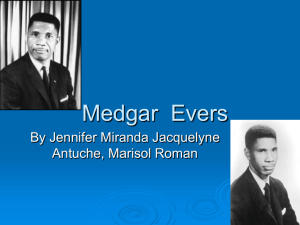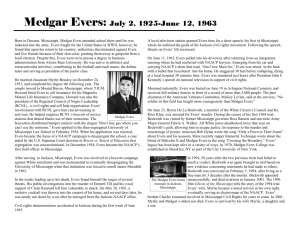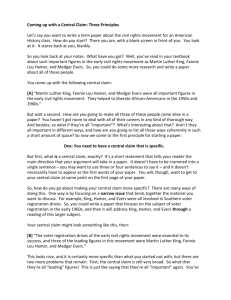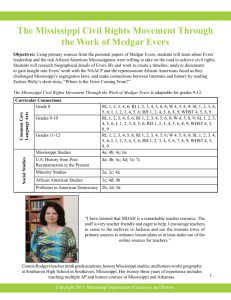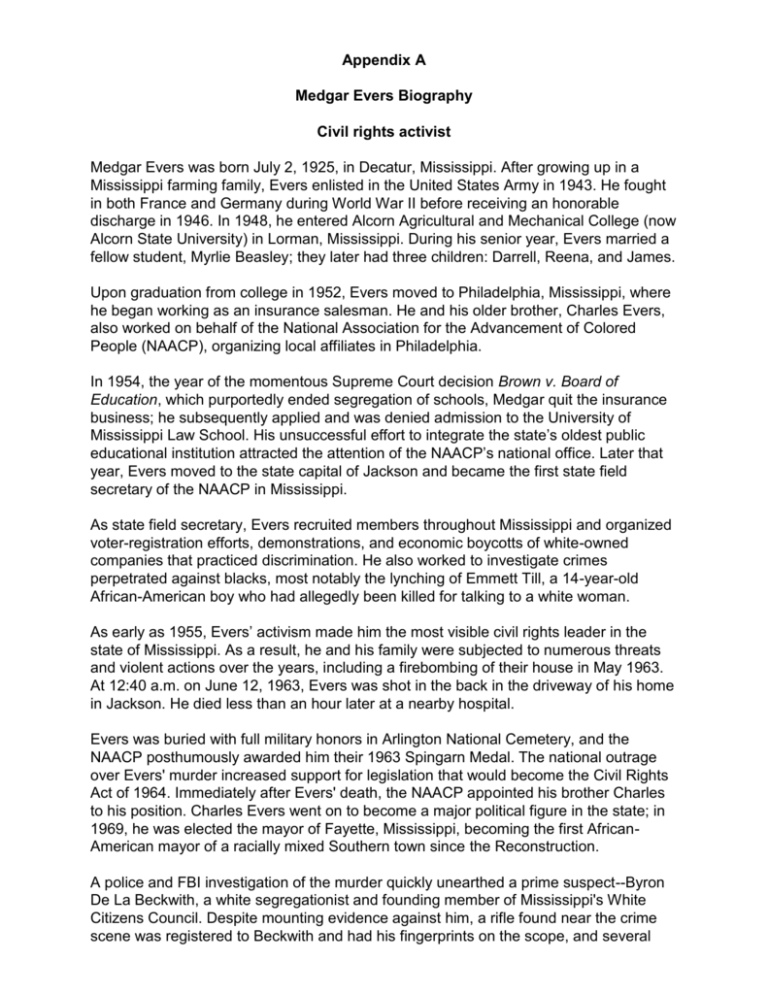
Appendix A
Medgar Evers Biography
Civil rights activist
Medgar Evers was born July 2, 1925, in Decatur, Mississippi. After growing up in a
Mississippi farming family, Evers enlisted in the United States Army in 1943. He fought
in both France and Germany during World War II before receiving an honorable
discharge in 1946. In 1948, he entered Alcorn Agricultural and Mechanical College (now
Alcorn State University) in Lorman, Mississippi. During his senior year, Evers married a
fellow student, Myrlie Beasley; they later had three children: Darrell, Reena, and James.
Upon graduation from college in 1952, Evers moved to Philadelphia, Mississippi, where
he began working as an insurance salesman. He and his older brother, Charles Evers,
also worked on behalf of the National Association for the Advancement of Colored
People (NAACP), organizing local affiliates in Philadelphia.
In 1954, the year of the momentous Supreme Court decision Brown v. Board of
Education, which purportedly ended segregation of schools, Medgar quit the insurance
business; he subsequently applied and was denied admission to the University of
Mississippi Law School. His unsuccessful effort to integrate the state’s oldest public
educational institution attracted the attention of the NAACP’s national office. Later that
year, Evers moved to the state capital of Jackson and became the first state field
secretary of the NAACP in Mississippi.
As state field secretary, Evers recruited members throughout Mississippi and organized
voter-registration efforts, demonstrations, and economic boycotts of white-owned
companies that practiced discrimination. He also worked to investigate crimes
perpetrated against blacks, most notably the lynching of Emmett Till, a 14-year-old
African-American boy who had allegedly been killed for talking to a white woman.
As early as 1955, Evers’ activism made him the most visible civil rights leader in the
state of Mississippi. As a result, he and his family were subjected to numerous threats
and violent actions over the years, including a firebombing of their house in May 1963.
At 12:40 a.m. on June 12, 1963, Evers was shot in the back in the driveway of his home
in Jackson. He died less than an hour later at a nearby hospital.
Evers was buried with full military honors in Arlington National Cemetery, and the
NAACP posthumously awarded him their 1963 Spingarn Medal. The national outrage
over Evers' murder increased support for legislation that would become the Civil Rights
Act of 1964. Immediately after Evers' death, the NAACP appointed his brother Charles
to his position. Charles Evers went on to become a major political figure in the state; in
1969, he was elected the mayor of Fayette, Mississippi, becoming the first AfricanAmerican mayor of a racially mixed Southern town since the Reconstruction.
A police and FBI investigation of the murder quickly unearthed a prime suspect--Byron
De La Beckwith, a white segregationist and founding member of Mississippi's White
Citizens Council. Despite mounting evidence against him, a rifle found near the crime
scene was registered to Beckwith and had his fingerprints on the scope, and several
witnesses placed him in the area—Beckwith denied shooting Evers. He maintained that
the gun had been stolen, and produced several witnesses to testify that he was
elsewhere on the night of the murder.
The bitter conflict over segregation surrounded the two trials that followed. Beckwith
received the support of some of Mississippi's most prominent citizens, including thenGovernor Ross Barnett, who appeared at Beckwith's first trial to shake hands with the
defendant in full view of the jury. In 1964, Beckwith was set free after two all-white juries
deadlocked.
After Beckwith's second trial, Myrlie Evers moved with her children to California, where
she earned a degree from Pomona College and was later named to the Los Angeles
Commission of Public Works. Convinced that her husband's killer had not been brought
to justice, she continued to search for new evidence in the case.
In 1989, the question of Beckwith's guilt was again raised when a Jackson newspaper
published accounts of the files of the now-defunct Mississippi Sovereignty Commission,
an organization that existed during the 1950s to help raise popular support for the
maintenance of segregation. The accounts showed that the commission had helped
lawyers for Beckwith screen potential jurors during the first two trials. A review by the
Hinds County District Attorney's office found no evidence of such jury tampering, but it
did locate a number of new witnesses, including several individuals who would
eventually testify that Beckwith had bragged to them about the murder.
In December 1990, Beckwith was again indicted for the murder of Medgar Evers. After a
number of appeals, the Mississippi Supreme Court finally ruled in favor of a third trial in
April 1993. Ten months later, testimony began before a racially mixed jury of eight
blacks and four whites. In February 1994, nearly 31 years after Evers' death, Beckwith
was convicted and sentenced to life in prison. He died in January 2001 at the age of 80.
In 1995, Myrlie Evers-Williams (she is now remarried and lives in Oregon) was elected
chairwoman of the board of directors of the NAACP. She is currently a member of the
board's executive committee.
© 2010 A&E Television Networks. All rights reserved.
"Medgar Evers." 2010. Biography.com. 9 Jul 2010, 08:22
http://www.biography.com/articles/Medgar-Evers-9542324.
Appendix B
“It may sound funny, but I love the South. I don’t choose to live anywhere else. There’s
land here, where a man can raise cattle, and I’m going to do it someday. There are
lakes where a man can sink a hook and fight the bass. There is room here for my
children to play and grow, and become good citizens—if the white man will let them....”
—Medgar Evers, “Why I Live in Mississippi”
Appendix C
Appendix D
Document 226328
CHARLES EVERS
The Black politician writes a letter to his brother, slain Civil Rights activist Medgar Evers.
"A Letter to Medgar/by Charles Evers".
Dear Medgar,
"I had always figured that you and I would wind up together fighting against all the things that seemed
to dehumanize our men and women and children. But somehow, I left you alone too soon in the fight.
You had just gotten started in the civil rights movement and I went up North to make money. It was you
who stuck it out here in Mississippi, you who gave our people a voice, you who told the white folks what
had to be done to make this country a happy place for all of us to live. You fought without me. I'll never
forgive myself for letting you battle alone. When we were kids, we always double-teamed to take on the
bullies. And when we did we were invincible. When you took on the Klan, the White Citizens Council, and
began laying down the law to the haters, I was far from the battlefield. Well, Medgar, things have
changed. And I have changed. And our folks are changing, too. We're starting to double-team on racism.
What's happening would really do you proud. We have our people in every single public school in this
state. We have black policemen in almost every town. Little by little, we're having a say in the education
of Mississippi's youth. You see black faces every day on television news programs. Asking questions and
supplying answers...When you died, I was tempted to take a foolish course, to start avenging your death
by 'getting even.' It would have been so easy to do away with the racists, one by one. I even brought
down guns from Chicago to do the job. Thank the Lord, I didn't go through with that madness. I'm
especially thankful because we've created something truly beautiful. Your big brother is the Mayor of
Fayette. Imagine, Medgar, we black folks actually control and govern and live happily in a bi-racial town
in the State of Mississippi. And it's your example that's steering us right: playing fair with one and all,
white and black...."
Love, Charles
Civil Rights leader MEDGAR EVERS was assassinated on June 12, 1963. His older brother CHARLES
EVERS was elected Mayor of Fayette, Mississippi in 1969 and reelected in 1973. He ran unsuccessfully
for Governor of Mississippi on an independent ticket in 1971. In 1978, he was the unsuccessful
Independent Party candidate for U.S. Senate, garnering 23% of the vote.


